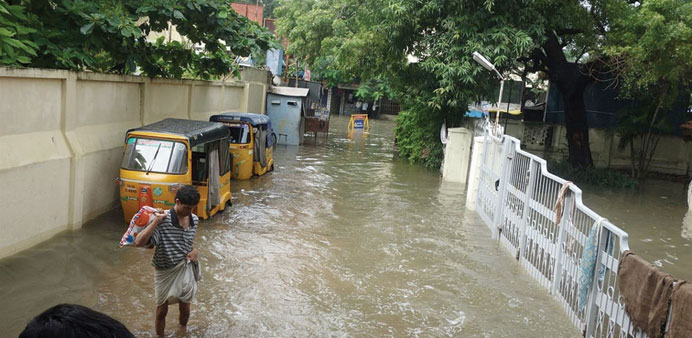By Nastasya Tay/Paris
As the clean up continues after devastating floods in Chennai, India’s environment minister says developed countries should pay for damage caused by climate change.
The heaviest rains in more than a century poured down on the state of Tamil Nadu in recent weeks, causing two major rivers to overflow. Parts of the coastal city of Chennai remained underwater for days, with many of the state’s nearly 70mn residents stranded on rooftops.
The armed forces were deployed to rescue thousands of people and distribute life-saving supplies, while the floods caused billions of dollars worth of damage. More than 1,000 people were injured and at least 280 people were killed, according to the UN’s emergency aid co-ordination body, OCHA.
“Floods is a natural phenomenon,” said Indian Environment Minister Prakash Javadekar on the sidelines of the COP21 gathering in Paris. “But of course, climate change has changed, made monsoon more erratic. There are untimely rains and there are also human factors.”
“The way we built our cities, the way we plug our drains and encroachments are also factors,” he told IRIN. “But this kind of unprecedented rain can be attributed to climate change, but that’s the job of scientists.”
A December 3 report by New Delhi-based think tank, Centre for Science and Environment, stressed that much of Chennai’s system of natural lakes and drainage canals has been filled in and built upon. The report said the disaster in Chennai was the result of a confluence of factors: climate change and poor urban planning.
That’s an accurate assessment, according to Sunandan Tiwari, deputy director of the International Council for Local Environmental Initiatives, a Delhi-based network of civil society groups advocating climate change-resilient cities. But he would add another element: bad governance.
“The rain triggered the manifestation of all the malpractices that have been taken over many years,” he told IRIN at COP21. “It’s bad land use decisions, people definitely cutting corners. It’s an open secret, but it’s come to the forefront now.”
In addition to its natural drainage system, Chennai had a network of 1,000-year-old tanks for drinking water and irrigation, according to Tiwari. They absorbed water from the catchment areas, but they were gradually filled in to create more land for construction. And government bureaucrats issued the permits to allow that to happen.
“It’s a lot of handshaking… therefore some things are glossed over, like environmental impact assessments,” he said.
As cities around the world are learning, the consequences of climate change are costly – very costly.
The floods in Chennai caused an estimated $3bn worth of damage, according to United Kingdom reinsurance broker Aon Benfield’s monthly report on global catastrophes.
As climate change continues, floods and other environmental disasters are bound to reoccur, causing untold billions worth of damage. The effects of climate change can be mitigated – by fixing catchment and drainage systems in Chennai, for example – but who will pay the tab?
That was one of a number of tricky questions that 195 ministers like Javadekar grappled with in Paris as they attempted to hammer out an unprecedented universal climate accord. Some critical points of contention remained while the deal being struck – like cash.
In the UN-led negotiations process, “loss and damage” refers to devastation wrought by climate change despite attempts to adapt to its impacts. It includes the loss of country land masses because of rising sea-levels, destruction caused by adverse weather events, and crop failures due to changing weather patterns.
Poorer countries argue that developed nations should provide financial assistance, particularly as their carbon emissions during industrialisation caused the majority of the climate change impacts felt today.
The British charity Oxfam says the poorest half of the world’s population – 3.5bn people – is responsible for just 10% of carbon emissions, despite being the most threatened by catastrophic storms, droughts and other severe weather shocks linked to climate change.
Yet, in the latest version of a possible COP21 accord, the words “compensation” and “liability” have been removed from the document. Delegates such as Javadekar, the Indian environment minister, question the utility of such an agreement.
“If we’re just talking about loss and damage without compensating,” he said, “what’s the use of hollow discussions?”
Developed countries pledged in 2009 to provide $100bn annually, beginning in 2020, to help developing nations deal with the effects of climate change. But civil society organisations say that needs to be scaled up dramatically.
India, along with other developing countries, is pushing hard for compensation to be reinserted into the draft accord. While observers say that’s unlikely, the agreement does not preclude support for such measures through other UN forums.
“We are with the vulnerable countries,” said Javadekar. “We need some kind of help.” - IRIN

Hundreds of people have died in floods in Chennai since last month.
